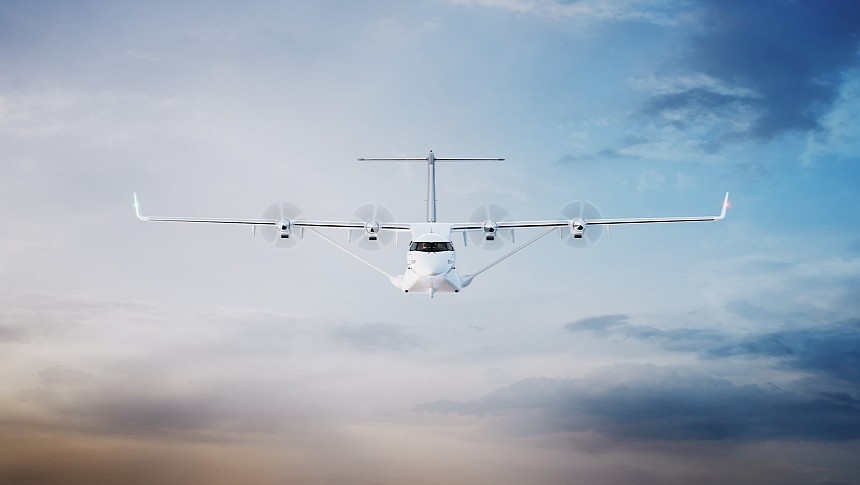The ES-30 claims to be the only one of its kind: a truly green, sustainable alternative to regional commercial airliners, which combines a 30-seat capacity with hybrid-electric propulsion. The latest financial boost will help accelerate its road to large-scale operations.
The Swedish air travel innovator Heart Aerospace is gearing up for one of its most important years ever with the launch of its full-scale aircraft demonstrator. In the meantime, it recently secured more than $105 million through Series B funding. Several new names joined the ranks of an elite group of investors, which includes United Airlines and Air Canada.
Both airliners are known for supporting a wide range of green solutions for the future of commercial aviation, ranging from alternative fuel (SAF) to all-electric and hybrid-electric technologies incorporated into new-generation aircraft designs. Air Canada pumped a further $5 million into Heart Aerospace with this new funding round, helping the Swedish startup reach a total of $145 million so far.
Among the numerous clean air transportation alternatives out there, the ES-30 stands out due to its size. While companies such as ZeroAvia and Cranfield Aerospace Solutions are working on adapting hybrid propulsion solutions to existing regional aircraft (by harnessing the power of green hydrogen), Heart Aerospace is taking a different approach. The ES-30 is a new-generation aircraft that will feature all-new technology.
Prior to this trailblazing version, the Swedish startup had developed and tested the smaller, all-electric ES-19. Fitted with a 400 kW electric motor and a lithium-ion battery pack, the ES-19 promised lower maintenance costs dramatically compared to conventional turboprops.
The ES-30, in turn, adds the option of a hybrid-electric mode for increased range. In full-electric mode, this 30-seater could cover routes of up to 200 km (124 miles). By switching to a hybrid-electric mode or by reducing its passenger capacity, the range would increase to an impressive 800 km (497 miles), making the ES-30 a viable alternative to regional airliners.
At the end of last year, Heart Aerospace was one of the aircraft makers selected by the giant public charter carrier JSX for its fleet renewal. The US carrier broke the norm with an unprecedented order amounting to 332 hybrid-electric aircraft (the other two manufacturers that were selected were the US-based Electra Aero and the French Aura Aero).
JSX's commitment brought Heart Aerospace's order book to a total of 250. These are just the firm orders, followed by options for 120 more units of the ES-30. These numbers show that the industry doesn't see a new-generation hybrid-electric airliner as a risky bet. The fact that it's the only one in this size category in line for the EASA (the European Union's Agency for Aviation Safety) certification is another positive reassurance. Still, this 30-seater isn't expected to enter service earlier than 2028.
Both airliners are known for supporting a wide range of green solutions for the future of commercial aviation, ranging from alternative fuel (SAF) to all-electric and hybrid-electric technologies incorporated into new-generation aircraft designs. Air Canada pumped a further $5 million into Heart Aerospace with this new funding round, helping the Swedish startup reach a total of $145 million so far.
Among the numerous clean air transportation alternatives out there, the ES-30 stands out due to its size. While companies such as ZeroAvia and Cranfield Aerospace Solutions are working on adapting hybrid propulsion solutions to existing regional aircraft (by harnessing the power of green hydrogen), Heart Aerospace is taking a different approach. The ES-30 is a new-generation aircraft that will feature all-new technology.
Prior to this trailblazing version, the Swedish startup had developed and tested the smaller, all-electric ES-19. Fitted with a 400 kW electric motor and a lithium-ion battery pack, the ES-19 promised lower maintenance costs dramatically compared to conventional turboprops.
The ES-30, in turn, adds the option of a hybrid-electric mode for increased range. In full-electric mode, this 30-seater could cover routes of up to 200 km (124 miles). By switching to a hybrid-electric mode or by reducing its passenger capacity, the range would increase to an impressive 800 km (497 miles), making the ES-30 a viable alternative to regional airliners.
At the end of last year, Heart Aerospace was one of the aircraft makers selected by the giant public charter carrier JSX for its fleet renewal. The US carrier broke the norm with an unprecedented order amounting to 332 hybrid-electric aircraft (the other two manufacturers that were selected were the US-based Electra Aero and the French Aura Aero).
JSX's commitment brought Heart Aerospace's order book to a total of 250. These are just the firm orders, followed by options for 120 more units of the ES-30. These numbers show that the industry doesn't see a new-generation hybrid-electric airliner as a risky bet. The fact that it's the only one in this size category in line for the EASA (the European Union's Agency for Aviation Safety) certification is another positive reassurance. Still, this 30-seater isn't expected to enter service earlier than 2028.








